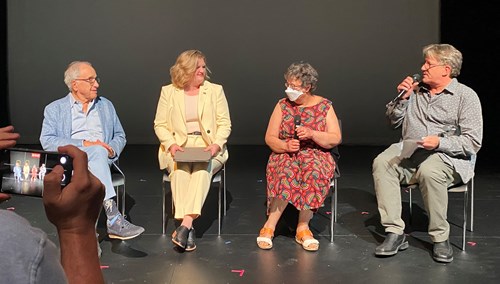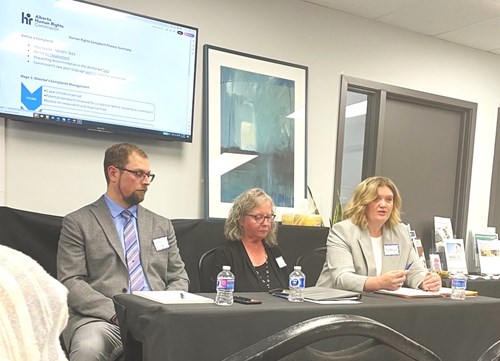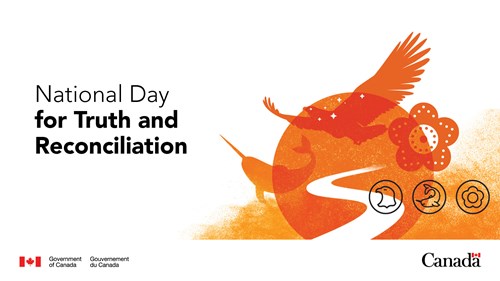Please note that when you subscribe to AHRIS, the Alberta Human Rights Commission knows your email address. Your email address or any other personal information we collect helps us provide service to you. The Commission is an independent commission created by the Government of Alberta. We do not share your personal information with other government agencies, community organizations, or individuals. Personal information collection is authorized under section 33 of the Freedom of Information and Protection of Privacy Act. For questions about personal information collection or to unsubscribe, email educationcommunityservices@gov.ab.ca.
Alberta Human Rights Information Service - September 24, 2024
In this issue:
National Day for Truth and Reconciliation is September 30
Human rights case law
1. Tribunal decisions: Latest highlights
Commission news
1. Northwest Territories Human Rights Commission
2. Indigenous Advisory Circle application deadline is extended!
3. Human Rights resources
4. In case you missed it…
5. Follow us on Instagram!
6. What’s new on our website
7. The Commission and the community
Other news
1. Former Chief of the Commission: Distinguished Alumni Award recipient
2. Accessibility NOW! events
National Day for Truth and Reconciliation is September 30
September 30 is Canada’s National Day for Truth and Reconciliation. Today, we remember the thousands of Indigenous children who did not return home from Indian Residential Schools across Canada due to decades of systemic discrimination and abuse.
The legacies of residential schools remain, impacting the lives of survivors, family members and loved ones, and countless Indigenous communities. In addition to the tragic loss of so many young lives, residential schools robbed Indigenous children of their languages, cultures, traditions, familial bonds, and so much more.
While the pain caused by residential schools is too extensive to sum up, pursuing truth and reconciliation is essential to healing the harms of the past. As we commemorate this day and reflect on this shameful history, the Commission encourages Albertans to take part in Orange Shirt Day events and play an active role in learning our history and uprooting discrimination and racism in our communities. We also call on organizations, businesses, workplaces, and other institutions to join us in committing to addressing inequities that Indigenous people face in this province.
The Commission will continue our work to uphold human rights and improve outcomes for Indigenous people through our Indigenous Human Rights Strategy. Through this strategy, we are working to make our systems more culturally relevant and reduce barriers that Indigenous people face.
Message from the Chief of the Commission and Tribunals
“The toll from the shameful legacy of residential schools is devastating. Indigenous communities continue to feel the effects of family separation, cultural assimilation, and trauma that resulted from the cruel and discriminatory practices of removing children from their communities and families and separating them from their languages and cultures.”
Read the full message from Kathryn Oviatt, K.C., Chief of the Commission and Tribunals, Alberta Human Rights Commission, acknowledging the importance of this day.
To participate in events commemorating Orange Day across Alberta, check the Government of Alberta, City of Edmonton, City of Calgary, and Orange Shirt Society websites.
Human rights case law
Tribunal decisions: Latest highlights
- Request for medical documentation not discrimination
Desalegn v Secure Protection Service Inc., 2024 AHRC 92 (Alberta Human Rights Tribunal, June 17, 2024)
The complainant alleged that he had been given fewer shifts as a security guard after taking a medical leave. The Chair found that the complainant had not made out a prima facie case of discrimination. There was insufficient evidence to demonstrate that the shift reduction was because of a disability. The complainant also alleged that the employer’s request for a medical note amounted to discrimination. However, the Chair found that it is common practice for an employer to request medical documentation to ensure the safety of its workforce. The complaint was dismissed.
- Dismissal for refusal to accept a fair and reasonable offer upheld
Lambert v Canadian Natural Resources Limited, 2024 AHRC 105 (Alberta Human Rights Tribunal, August 29, 2024)
The Chief upheld a Director’s dismissal for refusal of a fair and reasonable settlement offer. The settlement offer included $25,000 in general damages and $27,000 in lost wages. Although the lost wages were potentially less than what the complainant would have received if successful at hearing, the Chief nevertheless upheld the dismissal.
The Chief rejected the complainant’s argument that restrictive principles from the British Columbia Human Rights Tribunal should be adopted in this jurisdiction; the statutory regimes are different, including a clear legislative intent to prioritize and encourage settlements at the screening stage in Alberta. The Chief noted the following principles from previous cases apply when the Chief or Director of the Commission consider dismissals for a fair and reasonable settlement offer:
-
- the decision-maker may consider the merits of the case
- the decision-maker may assess the respective risks of the parties
- there is a range of fair and reasonable settlement offers
- an offer does not have to include all the remedies the complainant is seeking or include the highest award a complainant may be awarded at the Tribunal
- it is normal in settlements for the parties to agree to resolve the dispute without either party admitting wrongdoing or liability
- it is not unreasonable to have the matter concluded by seeking a full and final release
- a non-disparagement clause (a clause that restricts a current or former employee from making disparaging or negative comments about the employer to others) may be reasonable
The Chief also emphasized that:
-
- The decision-maker should be mindful of the impact a dismissal has on the complainant, as the complaint will be closed and the complainant will get no compensation.
- While the merits can be considered, including the relative risks to the parties in proceeding, the decision-maker should be cautious about overstating weaknesses in the case that have not been tested.
The decision-maker needs to look at all the circumstances of the offer to assess if it was fair and reasonable in the circumstances.
Read all Tribunal decisions free of charge on the Canadian Legal Information Institute (CanLII) website.
Commission news
1. Northwest Territories Human Rights Commission
On June 18, the Commission invited the Northwest Territories (NWT) Human Rights Commission to present on how they have incorporated restorative practices into their complaint process. The restorative practices approach emphasizes repairing relationships and encouraging social responsibility and shared accountability. This presentation will help us in determining how we might further incorporate restorative practices into our complaint process. Learn about the NWT Human Rights Commission and its processes here.
2. Indigenous Advisory Circle application deadline is extended!
The call for Expressions of Interest to join the Commission’s Indigenous Advisory Circle has been extended to October 15.
The Commission is seeking interest from First Nations, Inuit, and Métis people to participate in its Indigenous Advisory Circle. The mandate of the Circle is to provide independent advice and perspectives to the Commission on its strategies to address and reduce discrimination faced by Indigenous Peoples in Alberta.
Apply now!
3. Human Rights resources
Fiche d'information
*English follows.
La Commission est heureuse d’annoncer la publication en français de quatre fiches d’information clé élaborées en partenariat avec le Secrétariat francophone. Ces fiches expliquent simplement et clairement aux Albertaines et aux Albertains des sujets importants se rapportant aux droits de la personne, et sont accessibles à la page des ressources de notre site Web :
- Domaines et motifs protégés en vertu de la loi sur les droits de la personne de l’Alberta
- Les handicaps physiques ou mentaux et la discrimination
- Le harcèlement comme forme de discrimination
- Emploi : décharges, accords de licenciement et droits de la personne
*Veuillez noter que, bien que la Commission dispose de ressources en français, nous ne sommes pas en mesure de fournir des services dans cette langue. Si vous avez besoin de services de traduction au cours de la procédure de plainte, veuillez communiquer avec nous.
*Le français précède.
The Commission is pleased to share the publication of four key information sheets in French, developed in partnership with the French Secretariat. These information sheets provide Albertans with easy-to-understand explanations of key human rights topics and are available on the resources page of our website:
- Domaines et motifs protégés en vertu de la loi sur les droits de la personne de l’Alberta (Protected areas and grounds under the Alberta Human Rights Act)
- Les handicaps physiques ou mentaux et la discrimination (Employment – Releases, severance agreements and human rights law)
- Le harcèlement comme forme de discrimination (Harassment as a form of discrimination)
- Emploi : décharges, accords de licenciement et droits de la personne (Mental or physical disabilities and discrimination)
*Please note, while the Commission has resources available in French, we are not able to provide services in French. Should you require translation services during the complaint process, please contact us.
4. In case you missed it…
- New Members of the Commission
On June 21, the Government of Alberta appointed five new Members of the Commission: Rabie Ahmed Abdelhamid, Dana Christianson, Shawn Leclerc, Leigh Sherry, and Rod Wiltshire. We are also pleased to announce the reappointment of Members Nduka Ahanonu, Sandra Badejo, Dr. Evaristus Oshionebo, Karen Scott, and Wilma Shim.
Their diverse expertise and dedication bring fresh perspectives and continued excellence to our work. Learn more about each of the new and reappointed Members by reading their biographies.
- New Director of the Commission
On July 5, the Government of Alberta appointed Nicholas Milliken as Director of the Commission. His career in public service is marked by significant contributions, including his tenure as Alberta's Minister of Infrastructure and his groundbreaking role as the province’s first Minister of Mental Health and Addiction. Mr. Milliken holds a Juris Doctor from the University of Saskatchewan, a Bachelor of Commerce in Strategic Management and Organization, and a Bachelor of Arts in Economics and Philosophy from the University of Alberta.
Read the Order in Council announcements on the Government of Alberta website.
5. Follow the Commission on Instagram!
The Commission has launched an Instagram account t
to help connect more Albertans with key information about the human rights that impact them. Instagram will provide engaging and timely updates about new resources and publications, upcoming events, dates significant to human rights, and other important human rights information.
We look forward to providing you with a go-to source of information about human rights in Alberta through photos, short videos, reels, and other short-form content.
Be sure to follow the Commission on Instagram for up-to-date information about human rights in the province. We welcome you to engage with our content by liking, commenting, and sharing our posts.
6. What’s new on our website
- An easier way to subscribe!
You can now subscribe to our newsletter and receive updates on the latest happenings at the Commission by simply clicking this link.
Share it with your colleagues and network to stay connected and engaged with our work!
- Updated Medical Information
Medical information is information from a doctor about the state of a person’s health. In the workplace, employees may need to provide medical information from their doctor about whether they are fit to work or require accommodation at work.
See the updates on our Medical Information page and learn more about employer and employee responsibilities.
7. The Commission and the community
- On July 23, Evan Brunner, Program & Policy Consultant of the Commission, presented at the Educational Speakers Forum organized by Schizophrenia Society of Alberta. Ms. Brunner provided a general overview of the Commission with a focus on accommodation for individuals with physical and mental disabilities.
- On August 14, 2024, Sanjana Ahmed, Legal Counsel to the Director, presented at a seminar co-hosted by the Environmental Health Association of Canada and ARCH Disability Law Centre titled “Accessible Justice and Human Rights for People with Multiple Chemical Sensitivity.” The event was aimed at promoting awareness and advocacy for people with MCS. It included speakers from various areas of expertise such as doctors, lawyers, and executive members of organizations promoting accommodations in the workplace to address multiple chemical sensitivity.
- On August 15, the Chief of the Commission and Tribunals, Kathryn Oviatt, K.C., spoke on a panel following a screening of "Pride vs. Prejudice: The Delwin Vriend Story," which details the historic legal case involving Delwin Vriend, an Edmonton teacher who was terminated for being gay. The panel also featured Senator Paula Simons and Ronald Ghitter, Dignity Forum Chair, and was moderated by writer and director, Darrin Hagen.
The panellists discussed the significance of the Alberta Human Rights Act over the past 50 years and the importance of human rights in the present day. Watch the panel discussion here.

- On September 4, the Chief of the Commission and Tribunals, Kathryn Oviatt, K.C. spoke on the Orientation program for the students in the Low-income Individuals and the Law program at the University of Alberta Faculty of Law. The Chief discussed assisting low-income individuals before tribunals. During the discussion, the Chief also presented about tribunal justice, including the types of issues and how the Tribunal deals with them, with an emphasis on those issues that most impact low-income persons. The challenges with process and outcomes facing low-income persons who come before the Tribunal, including those who may have some type of disability, were also discussed during the presentation.
The panel consisted of representatives from the Residential Tenancy Dispute Resolution Service, the Citizen Appeals Panel, and the Alberta Human Rights Commission.

Other news
1. Former Chief of the Commission: Distinguished Alumni Award recipient
On September 4, former Chief of the Commission, Robert Philp, ’72 BA, ’75 LLB, received the Distinguished Alumni Award from the University of Alberta Faculty of Law. Mr. Philp has been a lawyer for 30 years and has contributed to the legal community in various ways, including as a provincial court judge in Alberta for nine years and as the Chief of the Commission and Tribunal for three years. Read the full details here.
2. Accessibility NOW! event
Barrier-free Alberta is hosting events in Calgary and Edmonton in support of stronger accessibility legislation in Alberta.
Accessibility standards ensure all individuals can live with dignity and independence. By enhancing accessibility, organizations help create greater opportunities for individuals with disabilities to engage in their communities, secure meaningful employment, access goods and services, use public transportation, and enter public spaces and businesses.
September 28, 2024
1:30 p.m. – 2:30 p.m. (Mountain Time)
*ASL interpretation available
Locations:
• Alberta Legislature Building (Front Steps)
10800 97 Ave NW
Edmonton, AB T5K 2B6
• McDougall Centre (East Lawn)
455 6 St SW
Calgary, AB T2P 4A2
Human rights upcoming dates
Throughout the year, the Alberta Human Rights Commission acknowledges significant dates related to human rights and diversity. To get involved or find an event near you, visit our events and significant dates page.
|

